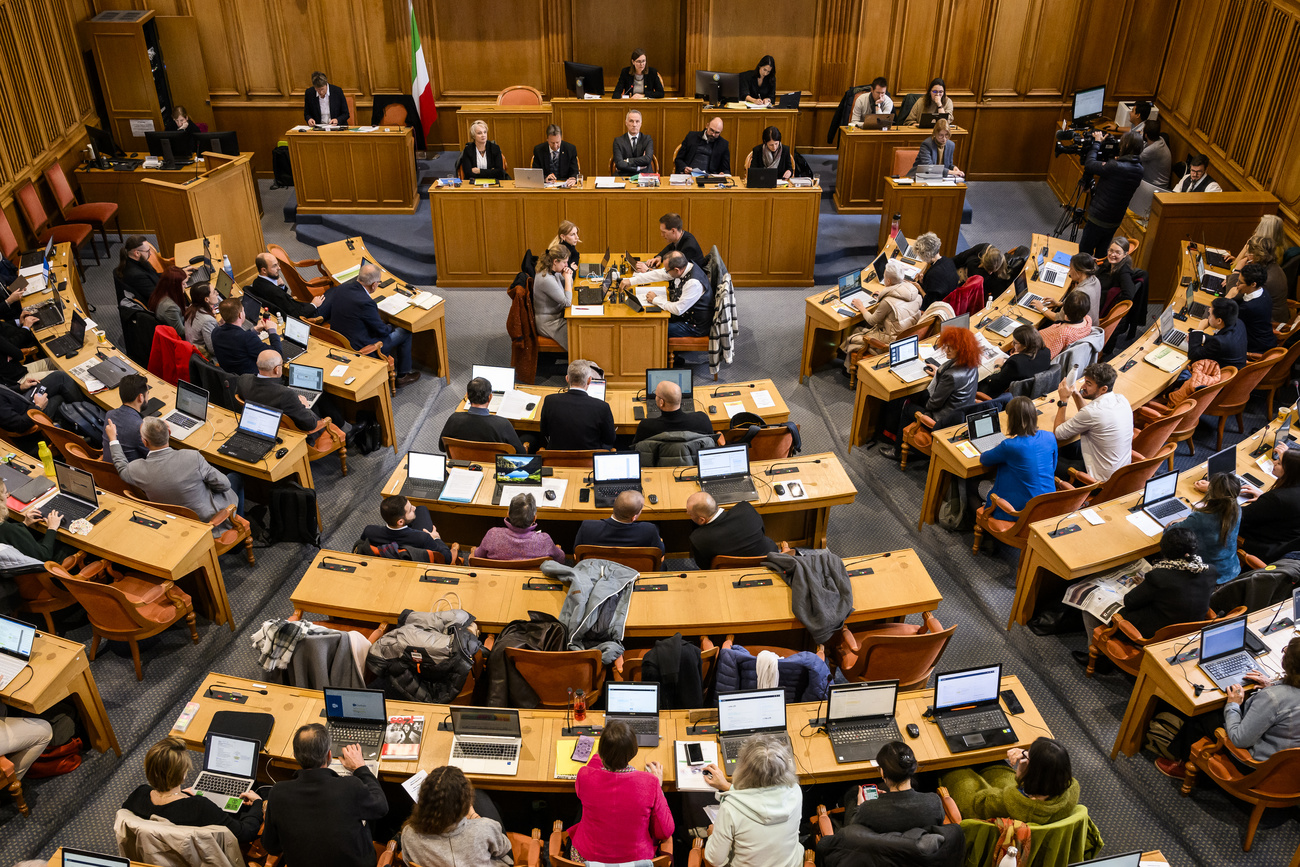
Are political compensation packages still a necessary practice?

Cantons in Switzerland are reviewing the annuities system for politicians. Life-long annuities, or compensation allowances after they have left office, have now become a rarity.
While annuities are still on-going in canton Neuchâtel, at the beginning of September the cantonal government submitted a proposal to abolish its annuities system. “Life-long annuities are now considered an outdated privilege,” stressed the Senate.
If the proposal is accepted by the legislature, Neuchâtel’s cantonal authorities will have a pension scheme identical to that of the rest of the canton’s personnel. However, there will be one major difference: when these cantonal politicians leave the office, they will receive a defined annuity based on the length of their term in office. The maximum allowance will be one year’s salary, or 15 months for those between the ages of 50 and 60.
Currently, outgoing parliamentarians from canton Neuchâtel who are over the age of 50 who have served a minimum of two terms, receive 36% of their CHF241,000 yearly year salary (about €250,000). If they are between 40 and 50-years-old, they receive 36% of their yearly salary for the duration equivalent to their term in office, provided their time in office was at least four years. If the term of office is less than one year or if the individual leaving office is younger than 40-years-old, there is no pension provided, but instead a one-off allowanceExternal link.
The Neuchâtel cantonal government is proposing to increase the government salary by CHF 24,000 per year to maintain the attractiveness of the position and to retain and attract high calibre individuals.
Lifetime annuities discontinued in most Swiss cantons
Neuchâtel is the latest canton that has abolished what many people consider an unjustified financial privilege. In November 2021, voters canton Geneva approved a popular initiative by the Liberal Greens to abolish the lifetime pensions of former members of the Senate. In June, the electorate of canton Ticino approved a similar reform.
However, the abolition of the lifetime annuity is followed by a salary increase. In Ticino, for example, the salary was raised by 13% to CHF277,000 per year. Alternatively, there has been an introduction of a severance pay or, for older politicians, a pension which bridges to 65 years of age, the age of retirement (65).
Cantons which still have lifetime annuity systems
Even in the handful of cantons that still have a lifetime annuity system, namely Graubünden, Vaud and Bern, it is probably only a matter of time until this practice is discontinued in these cantons as well.
In Graubünden, the Swiss Peoples Party launched a popular initiative entitled ‘No more golden parachutes for members of the government – No life-long pensions’. This initiative opposed a proposal which would allow cantonal officials to receive annuity until the age of 65. According to the ‘No more golden parachutes’ initiative, politicians in office receive adequate salaries and must be able to look after themselves, even after leaving office.
In canton Vaud, to date, the cantonal government has decided not to intervene in the pension system, at least for the time being. It has, however, requested a report on payments made in 2020 to 17 former parliamentarians and eight widows, which cost the canton CHF2.6 million.
Annuities: a system prior to the ‘second pillar’ plan
The system of annuities was in the 1940s and 1950s, when the function of cantonal authorities became a full-time profession and could no longer be carried out part-time.
“Historically, the longevity of office was much longer. At the time there was also no second pillar pension plan,’ explains Andrea Pilotti, a political scientist at the University of Lausanne. The second pillar is based on occupational pension plans and accident insurance. Employees who earn more than CHF21,150 a year are automatically insured by a second pillar pension fund. Pension plans and accident insurance have been mandatory for all employees for more than 25 years.
The three Swiss pension pillars, explained
For decades the system of annuities went unchallenged. The idea was that public servant salaries should be sufficient to attract the highest calibre individuals, competing with private sector salaries. Another argument, says Pilotti, came about in the end of the 19th century was the premise that compensating public servants with a fair salary and providing an annuity at the end of an individual’s term in office, would help to ensure the independence of public office.
However, in the last thirty years, the situation has changed radically, primarily due to anti-establishment and anti-privilege discourse. According to Pilotti, this has been primarily championed by the Swiss Peoples Party, which claims the importance of a political class must be at the service of society.
Some controversial cases drew public attention, further accelerated the calls for ending the annuity system for politicians.
In the early 2000s, the case of parliamentarian Ruth Metzler caused quite a stir. She was elected in 1999 to government as a member of the Christian Democratic Party (now The Centre after the 2009 merger with the Conservative Democratic Party) at the age of 34. She was ousted four years later by Christoph Blocher at the time leader of the Swiss Peoples Party. In theory, Ruth Metzler could have lived off her annuity pension for the rest of her life. However, she chose to work for the Novartis group. Since her salary then exceeded the determined threshold, her annuity was terminated.
More recently was the controversy surrounding Geneva’s Pierre Maudet. In 2020,, Maudet resigned from office following a scandal. Initially, Maudet, then 42, had renounced his CHF82,000 per year annuity. However, in 2022, he backtracked, asking for retroactive payments of what he was owed.
+Scandal-plagued politician makes return to Geneva cantonal government
“Nowadays, careers are becoming shorter. There are more cases of people not being re-elected, and also an increase of younger people entering public office than in the past. Moreover, positions as a cantonal government official are no longer seen as the final stage of a political career, but can now be a springboard for other careers,’ Pilotti says. ‘All this has meant that this annuity system is now perceived by most as archaic and unnecessary’.
What about federal parliamentarians?
The gross annual salary of a member of the federal parliamentarian is CHF456,854 (statistics as of 01.01.2022).
A federal parliamentarian is entitled to a full pension after at least four years in office. They may also receive a full pension if they have to leave office for health reasons.
The pension corresponds to 50 % of the salary of a sitting parliamentarian.
If the individual is gainfully employed after their term in office, and if this income, when added to the pension amount, exceeds the annual salary of a sitting parliamentarian, the pension is reduced by the excess. In other words, from a salary of CHF228,000, the pension is progressively reduced when the additional income exceeds the total current salary amount.

In compliance with the JTI standards
More: SWI swissinfo.ch certified by the Journalism Trust Initiative





























You can find an overview of ongoing debates with our journalists here . Please join us!
If you want to start a conversation about a topic raised in this article or want to report factual errors, email us at english@swissinfo.ch.